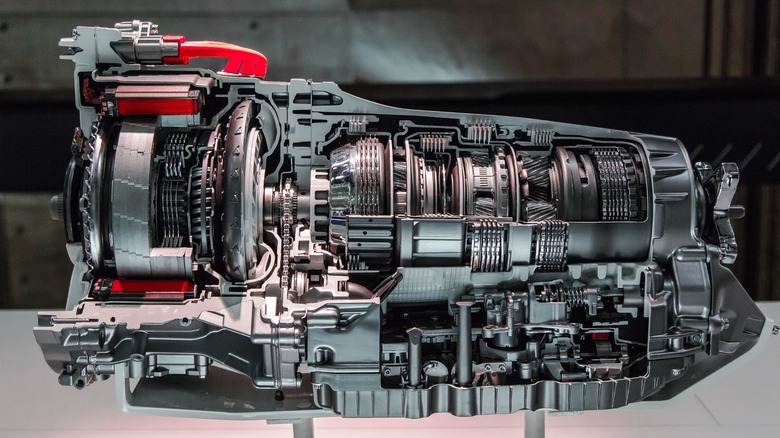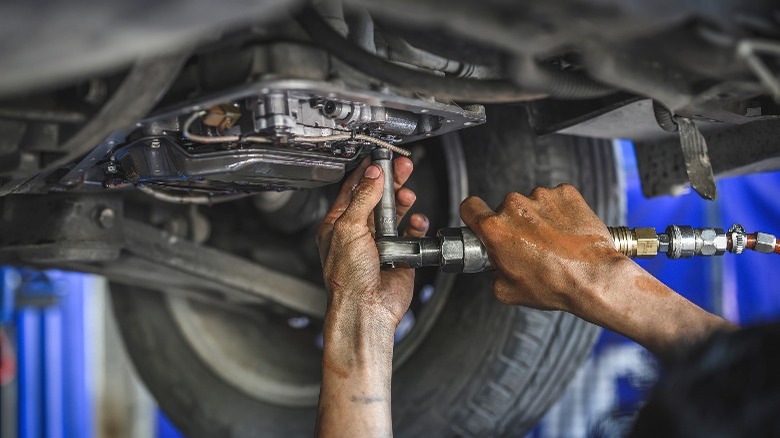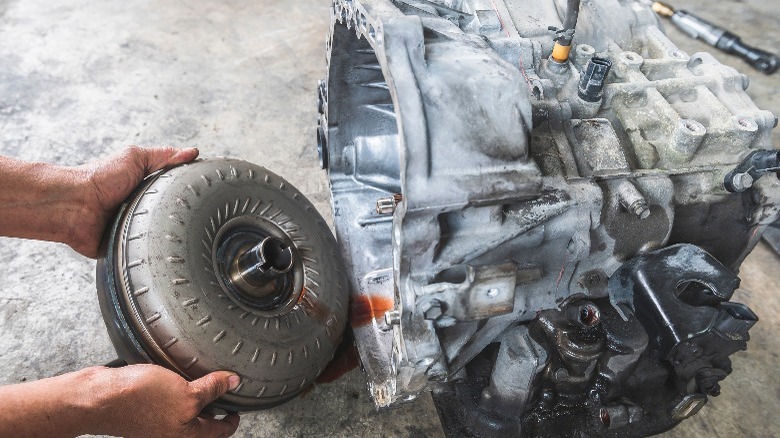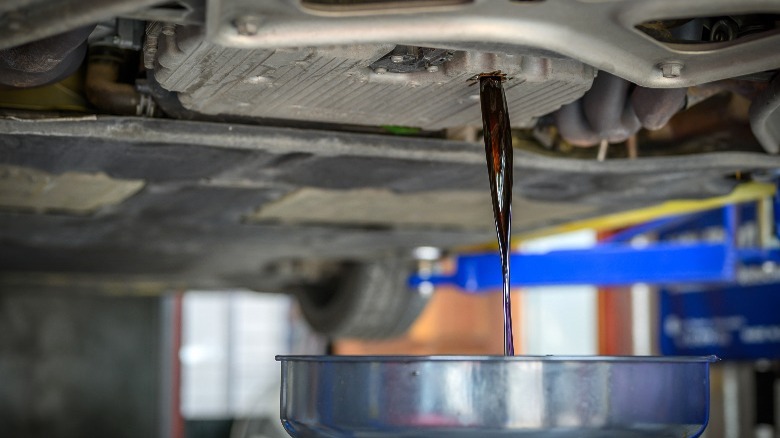
patruflo/Shutterstock
Automatic transmissions are highly complex automotive components. They’re significantly more complicated and challenging to work on than manual transmissions, which means expensive repairs and replacement parts. One factor contributing to the difficulty involved in automatic transmission repair is the massive amount of individual pieces that comprise an automatic transmission’s anatomy. There are literally hundreds of gears, clutch plates, retaining rings, fasteners, and other parts inside a modern automatic transmission. To make things even more complicated, almost all of these parts are installed sequentially in one direction, meaning if you need to repair or replace a gear towards the back of the transmission, you have to disassemble the entire thing to access the one part.
Therefore, it typically makes more sense to go ahead and rebuild or replace the entire transmission if a deep or expensive part is damaged. Automatic transmission repair does exist, but repairs tend to be reserved for less severe and less invasive damage. However, none of that translates to repairs, rebuilds, or replacements being cheap or easy to afford. Depending on your car’s make and model and your location, the average transmission repair job costs anywhere from a few hundred bucks to nearly $1,000. Automatic transmission rebuilds, on the other hand, can easily cost upwards of $2,000 to $3,000, while complete replacements average more than $3,000 to $5,000.
How much does it cost to repair an automatic transmission?

Setta Sornnoi/Shutterstock
Automatic transmission repair generally refers to things like transmission fluid flushes, torque converter replacements, sensor or seal replacements, and transmission control module replacements. These repairs typically don’t require your mechanic to drop and disassemble the entire transmission. That means that significantly less labor is involved, which translates to a less expensive repair bill. However, don’t let that fact make you feel too comfortable. Even minor repair jobs can be pricey when it comes to automatic transmissions.
A flush or replacement is more of a maintenance job, but it falls into the category of repairs because it can be a solution to minor transmission problems, like overheating. It’s also a common and inexpensive transmission repair job, averaging anywhere from $80 to $400. That price range is large because the cost depends on factors like your car’s make and model, the repair shop’s location and labor rate, and whether you replace the transmission filter and pan gasket as part of the service.
Other repairs have varying prices and also depend heavily on your vehicle and location. A torque converter replacement can cost between $600 and $1,000. While a new torque converter may only cost a few hundred bucks, the replacement is moderately labor-intensive, and you should expect to pay for at least four to five hours of labor time. A transmission control module replacement, on the other hand, is less labor-intensive. Depending on the vehicle, it may only require one hour of labor. The trade-off is that the module itself is pretty costly, and replacements average around $750 in total. Sensor and seal replacements are moderately cheap repairs. Depending on your vehicle, a transmission sensor replacement can cost between $200 and $350, while a seal replacement may cost as little as $150.
How much does it cost to replace or rebuild an automatic transmission?

Setta Sornnoi/Shutterstock
We mentioned that modern automatic transmissions are composed of hundreds of individual parts. From a labor standpoint, it doesn’t make sense to replace some of those pieces without overhauling the entire transmission. Individual parts can be pricey, but the real money-sink when it comes to automatic transmission repair is the mechanic’s labor. If your transmission has catastrophic damage or needs a deep planetary gear or clutch pack replacement, mechanics will typically recommend rebuilding or replacing the transmission entirely.
A transmission rebuild is extremely labor-intensive. Depending on the car, it can take multiple days to overhaul an automatic transmission. That labor includes removing the transmission, disassembling it, rebuilding the internals, flushing all fluid lines, and reinstalling the transmission on the car. In total, you should expect to pay between $1,500 and $3,500 for an automatic transmission rebuild, depending on your vehicle and location.
Replacing a transmission requires less labor — roughly 4 to 10 hours, depending on the car’s make and model — but is significantly more expensive due to the cost of a new transmission. Again, exact prices will depend on the type of car you drive, your location, and whether you opt for a brand-new transmission or a used one. That said, you can expect a complete replacement to cost at least $2,500 to $5,000.
How to take care of your automatic transmission and avoid costly repairs

Setta Sornnoi/Shutterstock
As you can see, automatic transmission repairs are expensive. For that reason, you may be wondering if there are any steps you can take to prevent premature damage and prolong your transmission’s life. The answer is yes. There are several things you can do to protect your automatic transmission and avoid costly repairs.
The most critical thing you can do is follow your manufacturer’s instructions regarding automatic transmission maintenance. That means keeping up with fluid and filter replacements and using the correct fluid type and parts. Depending on your car, you may need to replace your transmission fluid every 30,000 to 100,000 miles. That’s a big range, and it’s essential that you check your owner’s manual to learn the specific intervals for your vehicle.
Outside of routine maintenance, there are a couple of additional steps you can take to protect your automatic transmission. One of the most beneficial things you can do is drive your car gently and responsibly. That means you should avoid taking off from intersections too rapidly and driving aggressively. Don’t slam through your gears, even in an automatic, and practice coming to a complete stop when braking to ensure your transmission has a long and healthy life.